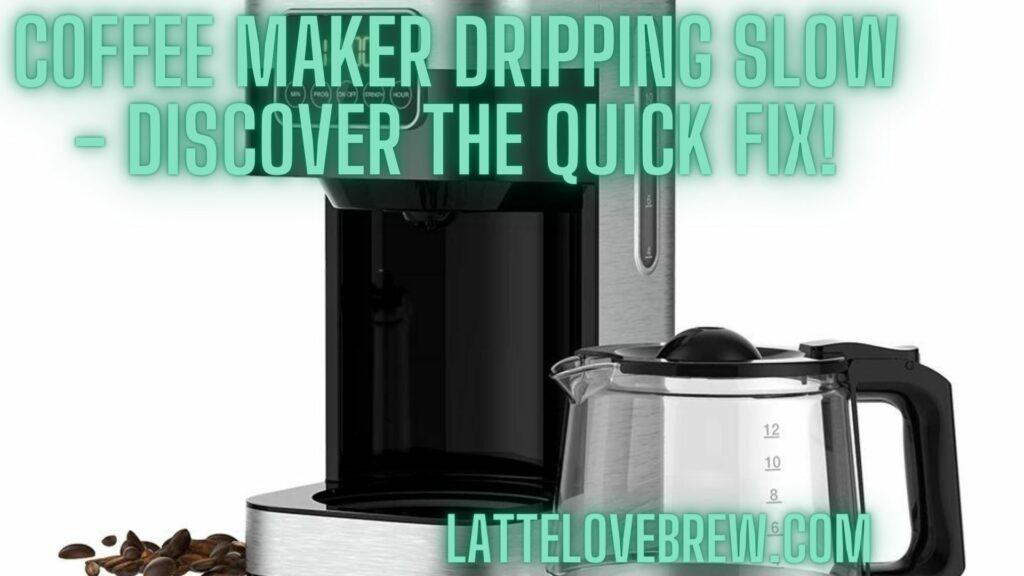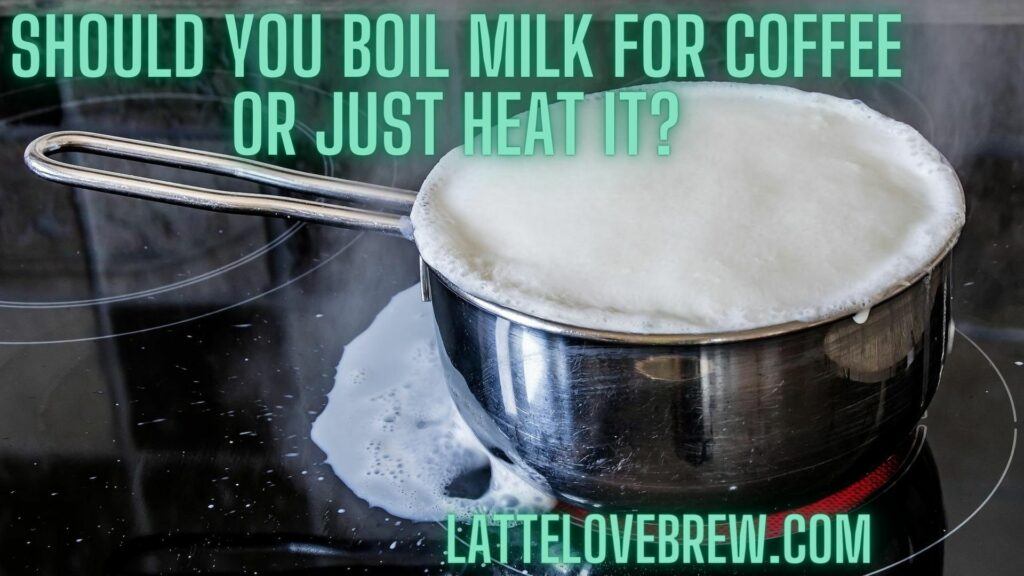Last updated on January 22nd, 2024 at 12:02
Got a problem with a coffee maker dripping slowly? Then read this article to find out what the problem is and uncover the solutions and the quick and easy fix.
In this article I talk about the 4 most common reasons and how to fix it and get your coffee maker working as it should.
Keep reading for the details.
Coffee Maker Dripping Slow – Reasons Why Your Coffee Maker Is Dripping Slowly
Table Of Contents
- 1 Coffee Maker Dripping Slow – Reasons Why Your Coffee Maker Is Dripping Slowly
- 2 #1 Mineral Build Up
- 3 #2 Your Coffee Maker Is Clogged
- 4 #3 You Used Too Much Coffee Grounds
- 5 #4 You Have A Malfunctioning Internal Component
- 6 Frequently Asked Questions About Coffee Maker Dripping Slow
- 6.1 Why Is My Coffee Machine Dripping Slowly?
- 6.2 How Do You Fix A Slow Drip Coffee Maker?
- 6.3 How Can I Improve My Coffee Drip?
- 6.4 How Many Times Should I Run Vinegar Through My Coffee Maker?
- 6.5 What Temperature Should The Water Be In A Coffee Maker?
- 6.6 Do Drip Coffee Makers Need Descaling?
- 6.7 Should I Run Straight Vinegar Through My Coffee Maker?
- 6.8 Should You Use Tap Water In Coffee Maker?
- 7 Final Thoughts – Coffee Maker Dripping Slow
When your coffee maker is dripping slowing it is usually a problem that is easily fixed and often much easier than you think.
Keurig and Nespresso coffee makers have a little additional step and cause of the problem than a regular drip coffee maker.
Let’s get to what is causing the problem and how to fix it!
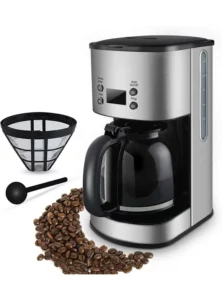
Read: Drip coffee vs pour over
#1 Mineral Build Up
Mineral build up is the most common reason and fault that is causing your coffee maker to drip coffee slowly.
Your water is full of calcium and minerals to some degree or another which, over time, will build up and if you have not taken care of your coffee machine by regularly running a descaling cycle.
Even if your coffee machine comes with a built-in water filter, don’t just fill your water reservoir with water straight from the tap. Prefilter your water by using a water filter jug.
By pre-filtering your water, you’ll end up with the twin benefit of better quality water in your machine and make your water filter for your machine last a little longer.
If the indicator light for descaling your espresso machine, Keurig coffee machine, or your drip coffee machine is not lit up, mineral build up may still be the problem.
The obvious solution is to run a high-quality deep clean and descaling of your coffee maker.
Fixing Mineral Build Up
With single serve coffee makers it is well worth your while to take the extra step in unclogging your needles.
This step is best taken before you start a descaling cycle.
Look out your needle maintenance tool. Open the brew head and with a long thin needle poke around inside both the exit needle and the entrance needle for a minute to remove any build up of grime.
Fill your needle maintenance tool with 50% distilled vinegar and hot water and put it in place, where you would put a coffee pod. Open and close your brew head 5 to 7 times in a pumping action.
Repeat this action 2 or 3 times to ensure your needles and the tubes leading up to and from them are clean and clear of old coffee build up.
Descaling your machine, regardless of which type of machine you have, is easy and follows the same process.
What you will need:
- Fresh clean water.
- Distilled white vinegar.
Empty your water reservoir and carafe. Remove all removable parts and clean them well.
Remove your water filter if your machine has one, shake it, clean and give it a good rise. If it needs to be replaced, replace it.
Clean the valves of your water reservoir also.
Fill your water reservoir with 50% distilled white vinegar and 50% water.
Make sure it is aligned correctly and properly installed and run a brew cycle until your water reservoir is empty.
Make sure your carafe or a suitable large coffee mug is in place to catch the water that comes out.
Repeat this process three times if your coffee maker is particularly dirty and has not been unclogged in a while.
Run several rinsing cycles using fresh clean water. Typically, you will need to run 5 to 7 and maybe even more to flush your machine of the scent of vinegar.
This is a process that you will need to conduct once per month with a 50% distilled white vinegar and 50% water to ensure your machine is clean and serving your perfect coffee every time.
You can run a lighter clean with 25% white vinegar every other week as a maintenance clean.
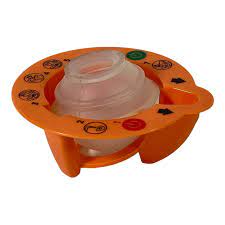
Read: Drip coffee Vs Espresso
#2 Your Coffee Maker Is Clogged
When your coffee machine has not been cleaned in a while or has not been cleaned properly after each use dust and coffee particles as well as mold can get into parts of your coffee maker that are unreachable.
This can lead to your coffee machine getting clogged and even stop brewing.
Unfortunately there is no way of telling if your machine is clogged or not.
Fixing A Clogged Coffee Machine
Fixing a clogged coffee maker is easy. Simply follow the instructions above for descaling a coffee machine and don’t forget to unclog the needles if you have a Keurig or Nespresso machine.
Running a descaling cycle will unclog all dirt and grime as well as the mineral build up.
The clogging will happen at the tubes and valves. If you want to, you can unclog your machine manually.
#3 You Used Too Much Coffee Grounds
Using too much ground coffee can lead to your coffee machine getting saturated and cause your coffee to slowly drip out of your machine.
Always weigh your coffee and never overfill your coffee filter. As a rule of thumb, leave at least a finger width from the top of your filter to ensure that it is not overfilled.
Keep in mind that too much coffee used will alter your coffee to water ratio.
The solution is simple: don’t overfill your coffee machine.
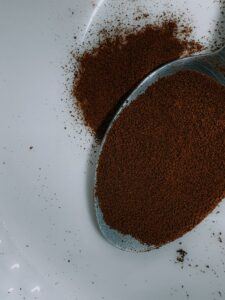
Read: Drip coffee
#4 You Have A Malfunctioning Internal Component
From time to time the problem of a slow dripping coffee maker, regardless of which type be it a drip coffee machine, an espresso machine or a Keurig coffee maker the problem might be that you have a malfunctioning internal component, a broken pump, a bust valve or whatever it may be.
The way in which some, not all, coffee machines are made can be easy to figure out what part is broken and why.
Depending on your own level of experience and expertise, you can fix it yourself or get a specialist to fix it for you.
Something to keep in mind is the cost of repair Vs the cost of a new machine.
If it is not too much more to buy a new upgraded machine it may be worth your while long term to get a new machine.
Frequently Asked Questions About Coffee Maker Dripping Slow
Why Is My Coffee Machine Dripping Slowly?
The two most common reasons for your coffee machine dripping slowly are your filter being clogged with coffee grounds and your machine being blocked with a large mineral deposit build up.
The solution to both situations is to clean your machine and descale it with white vinegar.
How Do You Fix A Slow Drip Coffee Maker?
If it is a drip coffee maker, check the compartment where you put your coffee and give it a good clean. Small particles may be blocking it.
Also, give the coffee maker a good deep clean and descaling using distilled white vinegar.
With a Keurig or Nespresso single serve coffee maker, don’t forget to clean and unclog the needles.
With an espresso machine or espresso maker, check for coffee particles blocking the flow and clean your machine. Descale it also as mineral build up may be the problem.
How Can I Improve My Coffee Drip?
The easiest way of making better drip coffee is to use a better quality coffee and switch to using whole beans if you are currently using ground coffee.
You can also improve your brewing by using a better quality grinder and getting a better and more consistent grind size.
A ceramic flat burr grinder will get the best quality grind. Grind in bursts of 5 seconds and rest for 3 seconds.
Use filtered water or bottled water instead of tap water.
Alter your coffee to water ratio by using more or less coffee to make a cup of coffee.
Clean and descale your coffee maker regularly.
How Many Times Should I Run Vinegar Through My Coffee Maker?
The number of times that you need to run vinegar through your coffee maker depends on how dirty it is and when you last descaled it.
If you have not descaled it in a while, run two or three cycles with 50% water and 50% distilled white vinegar. Once you have cleaned it, clean your machine at least once per month with 50% water and distilled white vinegar solution.
What Temperature Should The Water Be In A Coffee Maker?
The ideal coffee brewing temperature is from 195F to 205F (92C to 96C). Outside this brewing temperature your coffee will under or over extract and taste either slightly sour or too bitter.
Do Drip Coffee Makers Need Descaling?
The ideal coffee brewing temperature is from 195F to 205F (92C to 96C). Outside this brewing temperature your coffee will under or over extract and taste either slightly sour or too bitter.
Should I Run Straight Vinegar Through My Coffee Maker?
No, while vinegar is great for cleaning your coffee maker and removing the build up of calcium and mineral deposits as well as coffee stains. If you run in through your machine without diluting it, your coffee maker may become a fire hazard.
The strongest concentration that you should use is 1:1, equal parts vinegar and equal parts water.
Should You Use Tap Water In Coffee Maker?
You can use tap water in your coffee maker. Even if your machine has a built-in water filter, it is a good idea to filter your water before you add it. This way your water is double filtered, which I call a preventative maintenance step that I take.
You can also use bottled water.
Final Thoughts – Coffee Maker Dripping Slow
That problem of a coffee maker dripping slowly should be easy to fix in 95% of cases. It is only in the rarest and most extreme of cases that a component is broken and needs to be replaced.
Did these solutions work for you?
Are you a dab hand at fixing things and have your own unique solutions – share them with us!
Join our cool coffee community and share your coffee creations, great latte art designs and tell us all about the great new coffee beans that your trying out. Find us on Facebook/Meta.

